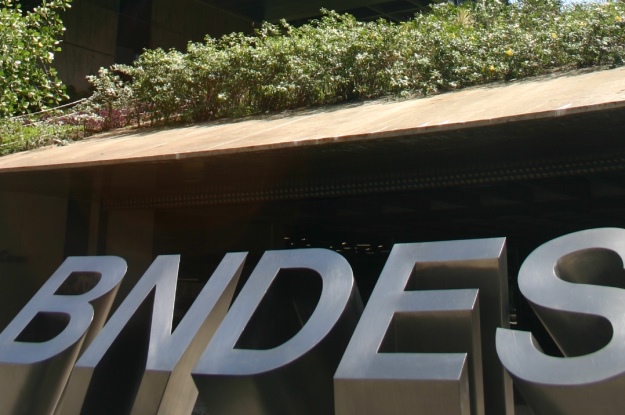Corrections appended below
Updated 8/17/2016
New leadership atop Brazil’s massive national development bank is unwinding a decade of rampant lending that fed large conglomerates and strained the country’s finances.
Over the past half-century, Brazil’s Banco Nacional de Desenvolvimento Economico e Social (BNDES) built huge power plants and highways through the industrial southeast, aided social programs in the drought-ridden northeast, and helped create some of today’s world-leading companies like airplane-maker Embraer and pulp producer Fibria. More recently, it helped save the Rio Olympics with an emergency loan.
Such mega-investment projects played a central role in Brazil’s economy over the last ten years of Workers’ Party rule, during which former President Luiz Inácio Lula da Silva and suspended President Dilma Rousseff showed a particular penchant for state-sponsored development.
But those days appear to be coming to an end for BNDES, which is the second-largest development bank in the world, behind only the China Development Bank and well ahead of the World Bank. A new bank president is promising to implement badly needed reforms aimed at reducing financing and refocusing on smaller businesses.
The shift comes amid new signs that BNDES’ own finances are in jeopardy from losses connected to a massive corruption scandal and national economic crisis, along with a growing consensus that the bank has become an obstacle to sustainable growth for Brazil. In 2015 alone, BNDES lent 695 billion reais ($208.5 billion), earning itself a reputation along the way as “lender of first resort for Brazil’s tycoons.”
The problem is not just who BNDES is lending to, but how much. The state-run bank effectively operates as a taxpayer-subsidized lender, borrowing from the national treasury at a discount rate of 7.5 percent. This translates to billions of dollars in losses for the state (a rough calculation puts the cost of the bank at about 3.5 percent of GDP from 2010 to 2015).
Because of its huge role in the economy, BNDES has become a major influence on monetary policy and put upward pressure on interest rates, according to Monica de Bolle, a senior fellow at the Peterson Institute for International Economics in Washington D.C.
BNDES has created a “significant section of the market that is not responsive to the central bank’s…monetary policy, which means that if you have an inflationary problem, you have to raise interest rates all the more,” de Bolle told AQ.
And indeed, Brazil has a problem with inflation, which was 10.67 percent in 2015 – more than double the central bank’s target. In turn, the central bank sought to fight inflation by raising its official lending rate to among the highest worldwide at 14.25 percent, as of publication. Such a high lending rate dampens economic activity.
There’s an argument that simply scaling back BNDES could help turn around an economy that shrank nearly 4 percent last year. That’s what the new government of interim President Michel Temer appears to be doing. Soon after assuming office in May, his government said BNDES would return 100 billion reais to the treasury over the coming three years in an effort to narrow the budget gap. He also appointed Maria Silvia Bastos Marques as the new president of BNDES, and she quickly promised to downsize its portfolio and sell equity assets.
Nicknamed the “Iron Lady” for her straightforward managerial ways, Bastos has also announced plans to focus on public-private partnerships and smaller businesses that typically have trouble accessing credit. This would be a big shift, as 60 percent of BNDES lending is currently dedicated to large conglomerates like meatpacker JBS and retail chain Lojas Americanas that arguably don’t need public support. (BNDES is today a shareholder of JBS rather than a creditor, since the loan was made in convertible bonds.)
After pledging those reforms, the bank’s emergency $243 million loan for the Rio Olympics came somewhat as a surprise last month – and not just because of its timing days ahead of the opening ceremony for the Games. Bastos – who was president of the city’s Olympic committee from 2011 to 2014 – justified the loan because it was financing infrastructure for long-term urban mobility projects. Infrastructure is another new focus for Bastos, albeit in a smaller role than BNDES had before.
To be sure, not all Brazil’s economic problems should be blamed on BNDES. Fernando Sotelino, a professor at Columbia University and former head of one of Brazil’s largest private banks, said his country’s economic issues stretch back before BNDES began to rely heavily on funding from the treasury. The real problem is that, “over the past 40 years, Brazil was never able to turn the corner and conquer the long-term fiscal credibility that would allow the Brazilian Treasury to borrow long term money at single digit fixed rates in Brazilian reais.”
But there seems to be a consensus that BNDES’ new board is proceeding in the right direction, especially concerning the movement away from treasury funding. Bastos is under pressure to act quickly, as it is unclear how long Temer will be in power as the impeachment trial against Rousseff winds down. Even if Temer stays in the Planalto, he’ll be fighting for his political life again during the 2018 election.
“The big challenge,” de Bolle told AQ, “is one of timing, because come 2018 there is likely to be a government change and we don’t know who is going to be heading the BNDES.”
Correction: Due to an editing error, an earlier version of this story referred to the BNDES’ reputation as a “lender of last resort.” It has been corrected to “lender of first resort.” An earlier version of this article also misconstrued a quote from Fernando Sotelino on Brazil’s borrowing challenges. That quote has been extended to reflect Brazil’s difficulty in borrowing money in reais, rather than in international markets generally.
This story was updated to clarify BNDES’ relationship with JBS.
—
Arguinzoni is an editorial intern with AQ.








